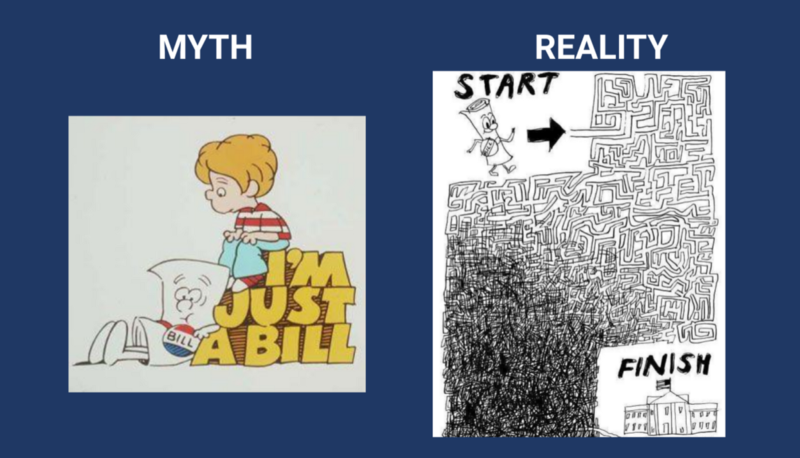
Each month, students from the Equity in Civics Youth Fellowship and the Youth As Civic Experts network meet virtually to discuss topics on equity in civic education. During this month’s discussion, students met with Patricia Leslie-Brown, CivXNow Project Manager, to discuss policy, advocacy, and lobbying at the local level.
Local government can be a mystery. When empowering students to be active civic agents in their communities it is important to show them how to engage with local politics. In her presentation, Leslie-Brown pulled from personal experiences working as a Chief of Staff in the Massachusetts state legislature. She provided insight into the myths that surround how government works and the places where engaged citizens can participate. A very important point that hit home for the youth network: whether or not you can vote, your elected officials are still making choices on your behalf. Students are credible sources for education policy input because their lived experiences lend to how policy plays out in real life. Because of this, they should feel empowered to have their voices heard by their elected officials.
During the meeting, students learned how local politics directly impacts and influences the quality of their lives, in many ways more deeply than national politics. Using Massachusetts as her example, Leslie-Brown walked students through the structure of state government (with the understanding that each state has its differences). She also gave insight into what lobbying can look like for students, how social media can be used as a tool to stay connected on issues they care about, and how long it actually can take for a bill to become a law.
Students were asked how they’d challenge themselves to dig deeper into local and state-level civic engagement. One student said, “I know how I connect with civic education, but I want to think deeper on how I can establish the passion and urgency and also seem eloquent.”. Another student mentioned they would, build more connections around town to see who they can build bridges with. “Connections are how people become successful and complete the tasks they set their mind to since they are not alone”. Many students wanted to work toward attending local school board meetings and following their elected officials and their votes on bills more closely.
Believing that knowledge is power, we encourage students to share what they’ve learned with their peers and adult allies. When asked what they’d take from this discussion, many students mentioned that they’d share the process and steps involved in a bill becoming a law. One student’s takeaway focused on the responsibility of each individual citizen in making government work- “…because your vote does count”. Another student mentioned that in order to gain the support you need to achieve your mission, one must “inform people about why it is significant” in the first place. Many students touched upon the importance of branding and telling personal stories to engage others in causes.
We’d like to leave you with what we think is the ultimate takeaway from this discussion: “In politics, things will not always be dramatic, sometimes being a politician is listening to people and trying to help others in a simple way…”
What about this discussion resonates with you? Add your voice! Join the discussion on social media using #CivicsForUS.
The Youth As Civic Experts network will lead a social media discussion on equity in civic education starting March 2nd. Watch the promotional video below to learn more!
Staff write-up by Amber Coleman-Mortley, Director of Social Engagement, iCivics.


 See All
See All